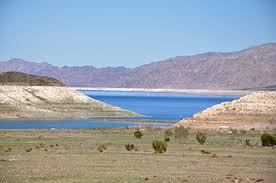Financial analysts assessing the health and future prospects of a business look at the numbers. Those that do it well look most carefully at the assumptions made by the company and how the numbers are calculated. Some of the biggest investment disasters trace their roots to questionable or outright fraudulent accounting practices.

As revenue comes into a company, it is used for expenses. The flow of cash is reduced as the company produces and delivers its products or services, and what’s left at the end is the profit. Increasing the revenue flowing in and reducing the expenses flowing out improves the results. When a company misstates, inflates or double-counts the revenue, the results appear better than they are, leading to a false confidence in the company’s performance and prospects.
This applies equally well to the role of water in the economy. In the Western US and adjacent Mexico, it’s no secret that the byzantine and complex structure of water rights has resulted in more water being allocated than is actually available from the flow of the Colorado River. In times of drought, the problem is exacerbated (just as an economic slowdown reduces the revenue available for companies to earn). But now, this polite fiction may be turning into outright fraud.
A New York Times analysis, “How the West Overcounts its Water Supplies“, published this past Sunday, exposes a large problem that has gone mostly unreported.
Water scarcity has increased groundwater pumping in the west. Water pumped out of aquifers must be recharged, or the aquifers will run dry. Leave aside for the moment the concern that, in many cases, it’s not known with certainty how much can be sustainably pumped from a given aquifer. A much more serious problem is how much of the recharging is water that’s already been counted as flowing into the dams and river systems. This is the water equivalent of double counting revenue for a company. Whether done in ignorance, intentionally, or in some combination, it overstates the health and performance of the company.
The inevitable results most often come during bad economic times. Companies that engage in dubious revenue practices have survived, even apparently thrived, for years during good times. During an economic slowdown, when revenue is scarce everywhere, the problem comes to light and those companies with the greatest exposure tend to suffer the greatest collapse in performance and stock price. When that happens is impossible to predict, that it will happen is a given.
The parallels are frighteningly clear. The Western US is suffering through the worst drought in memory. The worse-than-imagined water accounting problems of double counting supplies as reported in the Times should result in a re-evaluation of risks. Those companies, industries and localities where the “revenue” problem is most pronounced are those at greatest risk. Analysts and investors who most effectively identify those areas have an opportunity to reduce risk and to outperform.
